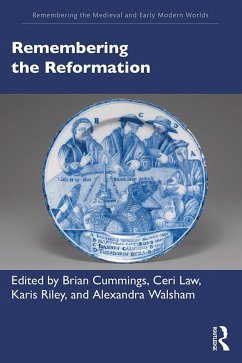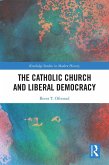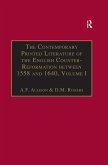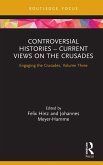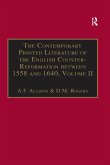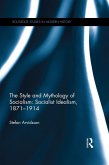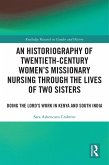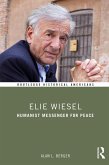Remembering the Reformation (eBook, PDF)
Redaktion: Walsham, Alexandra; Riley, Karis; Law, Ceri; Cummings, Brian
40,95 €
40,95 €
inkl. MwSt.
Sofort per Download lieferbar

20 °P sammeln
40,95 €
Als Download kaufen

40,95 €
inkl. MwSt.
Sofort per Download lieferbar

20 °P sammeln
Jetzt verschenken
Alle Infos zum eBook verschenken
40,95 €
inkl. MwSt.
Sofort per Download lieferbar
Alle Infos zum eBook verschenken

20 °P sammeln
Remembering the Reformation (eBook, PDF)
Redaktion: Walsham, Alexandra; Riley, Karis; Law, Ceri; Cummings, Brian
- Format: PDF
- Merkliste
- Auf die Merkliste
- Bewerten Bewerten
- Teilen
- Produkt teilen
- Produkterinnerung
- Produkterinnerung

Bitte loggen Sie sich zunächst in Ihr Kundenkonto ein oder registrieren Sie sich bei
bücher.de, um das eBook-Abo tolino select nutzen zu können.
Hier können Sie sich einloggen
Hier können Sie sich einloggen
Sie sind bereits eingeloggt. Klicken Sie auf 2. tolino select Abo, um fortzufahren.

Bitte loggen Sie sich zunächst in Ihr Kundenkonto ein oder registrieren Sie sich bei bücher.de, um das eBook-Abo tolino select nutzen zu können.
This stimulating volume explores how the memory of the Reformation has been remembered, forgotten, contested, and reinvented between the sixteenth and twenty-first centuries.
- Geräte: PC
- ohne Kopierschutz
- eBook Hilfe
- Größe: 16.85MB
Andere Kunden interessierten sich auch für
![The Catholic Church and Liberal Democracy (eBook, PDF) The Catholic Church and Liberal Democracy (eBook, PDF)]() Bernt OftestadThe Catholic Church and Liberal Democracy (eBook, PDF)42,95 €
Bernt OftestadThe Catholic Church and Liberal Democracy (eBook, PDF)42,95 €![The Contemporary Printed Literature of the English Counter-Reformation between 1558 and 1640 (eBook, PDF) The Contemporary Printed Literature of the English Counter-Reformation between 1558 and 1640 (eBook, PDF)]() A. F. AllisonThe Contemporary Printed Literature of the English Counter-Reformation between 1558 and 1640 (eBook, PDF)52,95 €
A. F. AllisonThe Contemporary Printed Literature of the English Counter-Reformation between 1558 and 1640 (eBook, PDF)52,95 €![Controversial Histories - Current Views on the Crusades (eBook, PDF) Controversial Histories - Current Views on the Crusades (eBook, PDF)]() Controversial Histories - Current Views on the Crusades (eBook, PDF)22,95 €
Controversial Histories - Current Views on the Crusades (eBook, PDF)22,95 €![The Contemporary Printed Literature of the English Counter-Reformation between 1558 and 1640 (eBook, PDF) The Contemporary Printed Literature of the English Counter-Reformation between 1558 and 1640 (eBook, PDF)]() A. F. AllisonThe Contemporary Printed Literature of the English Counter-Reformation between 1558 and 1640 (eBook, PDF)42,95 €
A. F. AllisonThe Contemporary Printed Literature of the English Counter-Reformation between 1558 and 1640 (eBook, PDF)42,95 €![The Style and Mythology of Socialism: Socialist Idealism, 1871-1914 (eBook, PDF) The Style and Mythology of Socialism: Socialist Idealism, 1871-1914 (eBook, PDF)]() Stefan ArvidssonThe Style and Mythology of Socialism: Socialist Idealism, 1871-1914 (eBook, PDF)56,95 €
Stefan ArvidssonThe Style and Mythology of Socialism: Socialist Idealism, 1871-1914 (eBook, PDF)56,95 €![An Historiography of Twentieth-Century Women's Missionary Nursing Through the Lives of Two Sisters (eBook, PDF) An Historiography of Twentieth-Century Women's Missionary Nursing Through the Lives of Two Sisters (eBook, PDF)]() Sara Ashencaen CrabtreeAn Historiography of Twentieth-Century Women's Missionary Nursing Through the Lives of Two Sisters (eBook, PDF)42,95 €
Sara Ashencaen CrabtreeAn Historiography of Twentieth-Century Women's Missionary Nursing Through the Lives of Two Sisters (eBook, PDF)42,95 €![Elie Wiesel (eBook, PDF) Elie Wiesel (eBook, PDF)]() Alan L. BergerElie Wiesel (eBook, PDF)39,95 €
Alan L. BergerElie Wiesel (eBook, PDF)39,95 €-
-
-
This stimulating volume explores how the memory of the Reformation has been remembered, forgotten, contested, and reinvented between the sixteenth and twenty-first centuries.
Dieser Download kann aus rechtlichen Gründen nur mit Rechnungsadresse in A, B, BG, CY, CZ, D, DK, EW, E, FIN, F, GR, HR, H, IRL, I, LT, L, LR, M, NL, PL, P, R, S, SLO, SK ausgeliefert werden.
Produktdetails
- Produktdetails
- Verlag: Taylor & Francis eBooks
- Seitenzahl: 326
- Erscheinungstermin: 4. Juni 2020
- Englisch
- ISBN-13: 9780429622076
- Artikelnr.: 59574812
- Verlag: Taylor & Francis eBooks
- Seitenzahl: 326
- Erscheinungstermin: 4. Juni 2020
- Englisch
- ISBN-13: 9780429622076
- Artikelnr.: 59574812
- Herstellerkennzeichnung Die Herstellerinformationen sind derzeit nicht verfügbar.
Brian Cummings is Anniversary Professor of English at the University of York and a Fellow of the British Academy. He edited The Book of Common Prayer (2013) and his book Mortal Thoughts (2013) won the Dietz Prize of the Modern Language Association of America. With Alexandra Walsham, he co-directed the AHRC project 'Remembering the Reformation' between 2016 and 2019. Ceri Law has worked at Queen Mary University of London, Cambridge University, and the University of Essex. She is the author of Contested Reformations in the University of Cambridge, c.1535-84 (2018). She was a Postdoctoral Research Associate on the AHRC 'Remembering the Reformation' project between 2016 and 2019. Karis Riley has degrees in Philosophy, Classics, and English Literature and is currently completing a book on Milton and the passions. She was a Postdoctoral Research Associate on the AHRC 'Remembering the Reformation' project between 2018 and 2019. Alexandra Walsham is Professor of Modern History at the University of Cambridge and a Fellow of the British Academy. She has published five books, including The Reformation of the Landscape (2011), which won the Wolfson History Prize in 2012. With Brian Cummings, she co-directed the AHRC project 'Remembering the Reformation' between 2016 and 2019.
1. Introduction: remembering the Reformation Part I: Repressed memory 2.
Stilled lives, still lives: Reformation memorial focus 3. The inheritance
of loss: post-Reformation memory culture and the limits of antiquarian
discourse Part II: Divided memory 4. Bread and stone: Catholic memory in
post-Reformation Leiden 5. Remembering the Holy League: material memories
in early modern France Part III: Fragmented memory 6. Remembering the past
in the Nordic Reformations 7. Rioting blacksmiths and Jewish women:
pillarized Reformation memory in early modern Poland Part IV: Inherited
memory 8. The first among the many: early modern cultural memory and the
Hussites 9. Remembering and forgetting the dead in the churches of
Reformation Germany Part V: Invented memory 10. The material of memory in
the seventeenth-century Andes: the Cross of Carabuco and local history 11.
The British invention of the Waldenses Part VI: Migrating memory 12. On the
road: exile, experience, and memory in the Anabaptist diaspora 13. The
legacy of exile and the rise of humanitarianism Part VII: Extended memory
14. The stones will cry out: Victorian and Edwardian memorials to the
Reformation martyrs 15. Religious heritage and civic identity: remembering
the Reformation in Geneva from the sixteenth to the twenty-first century
16. Afterword: memory practices and global Protestantism
Stilled lives, still lives: Reformation memorial focus 3. The inheritance
of loss: post-Reformation memory culture and the limits of antiquarian
discourse Part II: Divided memory 4. Bread and stone: Catholic memory in
post-Reformation Leiden 5. Remembering the Holy League: material memories
in early modern France Part III: Fragmented memory 6. Remembering the past
in the Nordic Reformations 7. Rioting blacksmiths and Jewish women:
pillarized Reformation memory in early modern Poland Part IV: Inherited
memory 8. The first among the many: early modern cultural memory and the
Hussites 9. Remembering and forgetting the dead in the churches of
Reformation Germany Part V: Invented memory 10. The material of memory in
the seventeenth-century Andes: the Cross of Carabuco and local history 11.
The British invention of the Waldenses Part VI: Migrating memory 12. On the
road: exile, experience, and memory in the Anabaptist diaspora 13. The
legacy of exile and the rise of humanitarianism Part VII: Extended memory
14. The stones will cry out: Victorian and Edwardian memorials to the
Reformation martyrs 15. Religious heritage and civic identity: remembering
the Reformation in Geneva from the sixteenth to the twenty-first century
16. Afterword: memory practices and global Protestantism
1. Introduction: remembering the Reformation Part I: Repressed memory 2.
Stilled lives, still lives: Reformation memorial focus 3. The inheritance
of loss: post-Reformation memory culture and the limits of antiquarian
discourse Part II: Divided memory 4. Bread and stone: Catholic memory in
post-Reformation Leiden 5. Remembering the Holy League: material memories
in early modern France Part III: Fragmented memory 6. Remembering the past
in the Nordic Reformations 7. Rioting blacksmiths and Jewish women:
pillarized Reformation memory in early modern Poland Part IV: Inherited
memory 8. The first among the many: early modern cultural memory and the
Hussites 9. Remembering and forgetting the dead in the churches of
Reformation Germany Part V: Invented memory 10. The material of memory in
the seventeenth-century Andes: the Cross of Carabuco and local history 11.
The British invention of the Waldenses Part VI: Migrating memory 12. On the
road: exile, experience, and memory in the Anabaptist diaspora 13. The
legacy of exile and the rise of humanitarianism Part VII: Extended memory
14. The stones will cry out: Victorian and Edwardian memorials to the
Reformation martyrs 15. Religious heritage and civic identity: remembering
the Reformation in Geneva from the sixteenth to the twenty-first century
16. Afterword: memory practices and global Protestantism
Stilled lives, still lives: Reformation memorial focus 3. The inheritance
of loss: post-Reformation memory culture and the limits of antiquarian
discourse Part II: Divided memory 4. Bread and stone: Catholic memory in
post-Reformation Leiden 5. Remembering the Holy League: material memories
in early modern France Part III: Fragmented memory 6. Remembering the past
in the Nordic Reformations 7. Rioting blacksmiths and Jewish women:
pillarized Reformation memory in early modern Poland Part IV: Inherited
memory 8. The first among the many: early modern cultural memory and the
Hussites 9. Remembering and forgetting the dead in the churches of
Reformation Germany Part V: Invented memory 10. The material of memory in
the seventeenth-century Andes: the Cross of Carabuco and local history 11.
The British invention of the Waldenses Part VI: Migrating memory 12. On the
road: exile, experience, and memory in the Anabaptist diaspora 13. The
legacy of exile and the rise of humanitarianism Part VII: Extended memory
14. The stones will cry out: Victorian and Edwardian memorials to the
Reformation martyrs 15. Religious heritage and civic identity: remembering
the Reformation in Geneva from the sixteenth to the twenty-first century
16. Afterword: memory practices and global Protestantism
